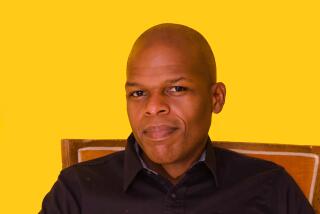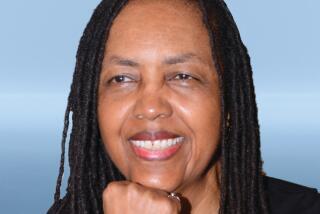Book review: ‘Power Concedes Nothing’ by Connie Rice
Power Concedes Nothing
One Woman’s Quest for Social Justice in America, from the Kill Zones to the Courtroom
Connie Rice
Scribner: 368 pp., $26
Connie Rice is known in Los Angeles as a brilliant civil rights advocate and agitator, but people farther afield have often confused her with Condi, the former secretary of State. Connie narrowly escaped being Condoleezza, a family name; the two Rices are second cousins (and hold disparate political beliefs). Connie Rice dispenses with any confusion in the first pages of her memoir “Power Concedes Nothing” so she can get down to the business of telling her story.
That story begins with a family history that stretches back to slaves, slave owners and Native Americans. The way she sees it, her predecessors came out of servitude with tiny advantages — stability, resources, skills, determination — that set them on a trajectory to success. Rice was born to a career Air Force man and a biology teacher who valued learning; despite her peripatetic youth, Rice was confident, easily found a social niche and achieved academically.
Yet from a young age, she was aware that not everyone shared her fortune. The light-skinned Rice tells the story of a darker boy on an Arizona playground who asked, “What IS you?” — he couldn’t believe that they were both black. With an uneasy sense of commonality, she pushed — something she does again and again in her life — and visited his home; it was her first genuine encounter with the deprivations of poverty. Rice looks back to that encounter not because of their shared identity but for what it revealed to her: the disparity of opportunity and circumstance. By her teens, steeped in the teachings of the Rev. Martin Luther King Jr. and moved by Rep. Barbara Jordan, she was convinced she must “end the inequality conspiracy, not join it.”
This passionate conviction drove her to Harvard-Radcliffe, then law school at New York University. The summer internships that law students take their second year have classically been thought of as a tacit line to a career with that firm, and Rice landed one at the NAACP’s Legal Defense Fund. That was 1982, the summer that decisions by the Supreme Court meant that states could renew their pursuit of death penalty cases. “We had vowed to do whatever it took to keep everyone alive,” Rice writes of the stance that she and a pair of determined fellow interns took. “We were too inexperienced to know that it could not be done.” She recounts their near round-the-clock work, including late-night filings and Southern court conflicts, with breathless detail.
She spends less time on her personal life: In one notable elision, she mentions withut any elaboration that her dedicated study of taekwondo began after being attacked in a college dorm. without any elaboration. Her marriage and amicable divorce take up only a few pages. “I became free,” she concludes, “to once again live alone and for my work.” If this bold feminist assertion merits further discussion, she hasn’t got room for it. There is social justice work to do.
It landed with a blast not long after she came to lead the Los Angeles office of the LDF; she was still getting her bearings when the videotaped beating of Rodney King by officers of the LAPD in 1991 changed the game. The LDF became an advocate for police reform, in both its regular external dealings with the community and internally, where long-standing traditions stood in the way of racial and gender equality and voices for change. The LDF helped to launch class-action lawsuits against the LAPD and L.A. County Sheriff’s Department to challenge different aspects of systemic abuse. (Full disclosure: At the time I was employed by the ACLU of Southern California, one of the organizations that partnered with the LDF.) Tensions rode high: Rice was even bodily thrown out of the offices of the Police Protective League.
That conflict made what happened later all the more remarkable: After news of police abuses blew up into the Rampart corruption scandal, it was the Police Protective League that called Rice. The league felt higher-ups, who’d been given a pass, should also be held responsible and thought an investigative report from its harshest critics might be the best way forward. Rice signed on to work with Erwin Chemerinsky, now head of the UC Irvine law school, and with a few bumps, found allies among her adversaries. In settling a suit against the LAPD’s K-9 unit, for example, she discovered its own officers were ready to implement reforms of their own devising. All it took was finding the right lever to move obstacles out of the way.
One of those obstacles was Bernard Parks. In general, Rice resists pointing accusatory fingers, but she singles out Parks as resisting and undermining police reforms while he was chief of the Los Angeles Police Department. “I told him that the voters of Los Angeles had approved the creation of an inspector general and that he had no right to overturn their decision,” she writes. “He looked amused for a second, then replied that the voters did not run the LAPD. When it came to the LAPD, he said, ‘I am the law.’”
She is shocked and outraged, an emotional brew that long simmered underneath both her advocacy and action. Years earlier it sent her to the Jordan Downs public housing project, a shattered community in the grips of gang violence. In the early 1990s, the neighborhood’s unemployment was at 65%; 75% of its adults were functionally illiterate; 75% of its high school students dropped out after ninth grade; and its murder rates were 500 times higher than Rice’s own neighborhood. “We had accepted this litany of catastrophic failure as a reasonable state,” she writes. Rice relied on key members of the community to function as colleagues and guides. She sat in on gang truce negotiations, visited prisons where former football great Jim Brown’s Amer-I-Can classes seemed to bring about real emotional change, and herself became someone who could pass messages from the street to the police — that is, after Bill Bratton took charge of the LAPD. In an unusual move, Rice left LDF to begin anew with the Advancement Project, a small law firm she and her partners call an “action tank.”
All these efforts culminated in a massive 2007 report to the City Council, “A Call to Action: A Case for a Comprehensive Solution to L.A.’s Gang Violence Epidemic.” Over more than 1,000 pages, it innovatively positioned gang violence as a public health issue and children’s public safety as a right. Rice allows glimpses behind the scenes of how the report came to be, including a critical meeting between her and Mayor Villaraigosa, a former civil rights ally whose support was uncertain. Yet this scene shows how thin other parts of her narrative are — the research and partnerships that built the report get little attention. In fact, the acknowledgments reveal that Rice’s first draft of this book was twice as long as this one.
At times, the result feels uneven, more personal here, more procedural there. But she has a big, important story to tell: of her passion, her history, her legal record and her connection to both the powerful and the underprivileged in Los Angeles.
More to Read
Sign up for our Book Club newsletter
Get the latest news, events and more from the Los Angeles Times Book Club, and help us get L.A. reading and talking.
You may occasionally receive promotional content from the Los Angeles Times.







